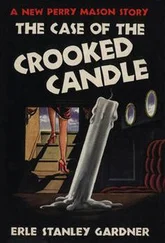Captain Harder threw his weight against the door. As well have thrown his weight against the solid masonry of a wall.
“Hello,” he called. “Are you safe, Dangerfield? This is the police!”
The men could hear the sound of frantic blows on the opposite side of the door.
“Thank God! Quick, get me out of here. Smash in the door. It’s a foot thick. Get something to batter it down with!”
The words were faint, muffled. The blows which sounded upon the other side of the door gave evidence of the thickness and strength of the portal.
Captain Harder turned to one of the men.
“How about keys?”
“I’ve got ’em, Captain, but where do we put ’em?”
The officer stepped back to look at the door.
There was not a sign of a lock or keyhole in it. There was a massive knob, but nothing else to show that the door differed from the side of the wall, save the hairline which marked its borders.
“Smash it in! All together!”
They flung themselves against the door.
Their efforts were utterly unavailing.
“Hurry, hurry!” yelled the voice on the other side of the door. “He’s going to... No, no! Don’t. Oh! Go away! Don’t touch that door. Oh... Oh... Not that!”
The voice rose to a piercing wail of terror, and then was silent. The squad pounded on the door, received no answer.
Captain Harder whirled to examine the loft.
“There’s a bar over there. Let’s get this door down.”
He raised the whistle to his lips, blew a shrill blast. The two men who had been guarding the stairs came up on the run.
“Get this door down!” snapped the police captain. “And let’s make it snappy.”
They held a block of wood so that it formed a fulcrum for the bar, inserted the curved end, started to pry. The door was as solid as though it had been an integral part of the wall. Slowly, however, the men managed to get the bar inserted to a point where the leverage started to spring the bolts.
Yet it was a matter of minutes, during which time there was no sound whatever from that mysterious inner room.
At length the door swayed, creaked, pried unevenly, sprung closed as the men shifted their grips on the bar to get a fresh purchase.
“Now, then, boys!” said Captain Harder, perspiration streaming down from his forehead and into his eyes. “Let’s go!”
They flung themselves into the work. The door tottered, creaked, slowly pried loose, and then banged open.
The squad stared at a room built without windows. There was ventilation which came through a grating in the roof. This grating was barred with inch-thick iron bars. The air sucked out through one section, came blowing through another. The air seemed fresh enough, yet there was an odor in that room which was a stale stench of death. It was the peculiar, sickeningly sweet odor which hangs about a house which has been touched by death.
There was a table, a reclining chair, a carpet, a tray of food, a bed. The room gave evidence of having been lived in.
But it was vacant, so far as any living thing was concerned.
On the floor, near the door which had been forced, was a pile of clothing. The clothing was sprawled out as though it had covered the form of a man who had toppled backward to the door, stretched his full length upon the floor, and then been withdrawn from his garments.
Captain Harder bent to an examination of the garments. There was a watch in the pocket which had stopped. The stopping of the watch was exactly five minutes before, at about the time the officers had begun pounding at the door.
There was a suit of silk underwear inside of the outer garments. The tie was neatly knotted about the empty collar. The sleeves of the shirt were down inside the sleeves of the coat. There were socks which nested down inside the shoes, as though thrust there by some invisible foot.
There was no word spoken.
Those officers, reporters, detectives, hardened by years of experience to behold the gruesome, stared speechlessly at that vacant bundle of clothing.
Charles Ealy was the one who broke the silence.
“Good heavens! There’s been a man in these clothes and he’s been sucked out, like a bit of dirt being sucked up into a vacuum cleaner!”
Captain Harder regained control of himself with an effort. His skin was still damp with perspiration, but that perspiration had cooled until it presented an oily slime which accentuated the glistening pallor of his skin.
“It’s a trap, boys. It’s a damned clever trap, but it’s just a trap. There couldn’t have been...”
He didn’t finish, for Ruby Orman, speaking in a hushed voice, pointed to one of the shoes.
“Try,” she said, “just try fitting a sock into the toe of that shoe the way this one is fitted, and try doing it while the shoe’s laced, or do it and then lace the shoe afterward, and see where you get.”
“Humph,” said Ealy, “as far as that’s concerned, try getting a necktie around the collar of a shirt and then fitting a coat and vest around the shirt.”
Captain Harder cleared his throat and addressed them all.
“Now listen, you guys, you’re actin’ like a bunch of kids. Even supposing there was some one in this room, where could he have gone? There ain’t any opening. He couldn’t have slid through those bars in the ventilator.”
Some of the detectives nodded sagely, but it remained for Rodney to ask the question which left them baffled.
“How,” he asked, “was it possible to get the foot out of that laced shoe?”
Captain Harder turned away.
“Let’s not get stampeded,” he said.
He started to look around him.
“Cooked food’s been brought in here at regular intervals... the man that was here was Dangerfield, all right. Those are his clothes. There’s the mark of the tailor, and there’s his gold-scrolled fountain pen. His watch has his initials on, even his check book is in the pocket.
“I tell you, boys, we’re on the right track. This is the place Dangerfield’s been kept, and it’s that inventor who’s at the bottom of the whole thing. We’ll go knock his place over, and we’ll probably find where Dangerfield is right now. He was spirited away from here, somehow.
“Those clothes were left here for a blind. Don’t get stampeded. Here, feel the inside of the cloth. It’s plumb cold, awfully cold. If anybody’d been inside those clothes within five minutes, the clothes’d be warm.”
One of the officers nodded. His face gave an exhibition of sudden relief which was almost ludicrous. He grinned shamefacedly.
“By George, Captain, that’s so! Do you know, for a minute, this thing had me goofy. But you can see how cool the clothes are, and this watch is like a chunk of ice. It’d be warm if anybody had been inside those clothes.”
“Who,” asked Sid Rodney, “was it that was calling to us through the door?”
Captain Harder stepped to the door, dragged in the bar.
“I don’t know. It may have been a trick of ventriloquism, or it may have been a sound that was projected through the ventilating system. But, anyhow, I’m going to find out. If there’s a secret entrance to this room, I’m going to find it if I have to rip off every board of the walls one at a time.”
He started with the bar, biting it into the tongue and groove which walled the sides of the room. Almost instantly the ripping bar disclosed the unique construction of that room.
It consisted of tongue and groove, back of which was a layer of thick insulation that looked like asbestos. Back of that was a layer of thick steel, and the steel seemed to be backed with concrete, so solid was it.
By examining the outside of the room, they were able to judge the depth of the walls. They seemed to be at least three feet thick. The room was a veritable sound-proof chamber.
Читать дальше












